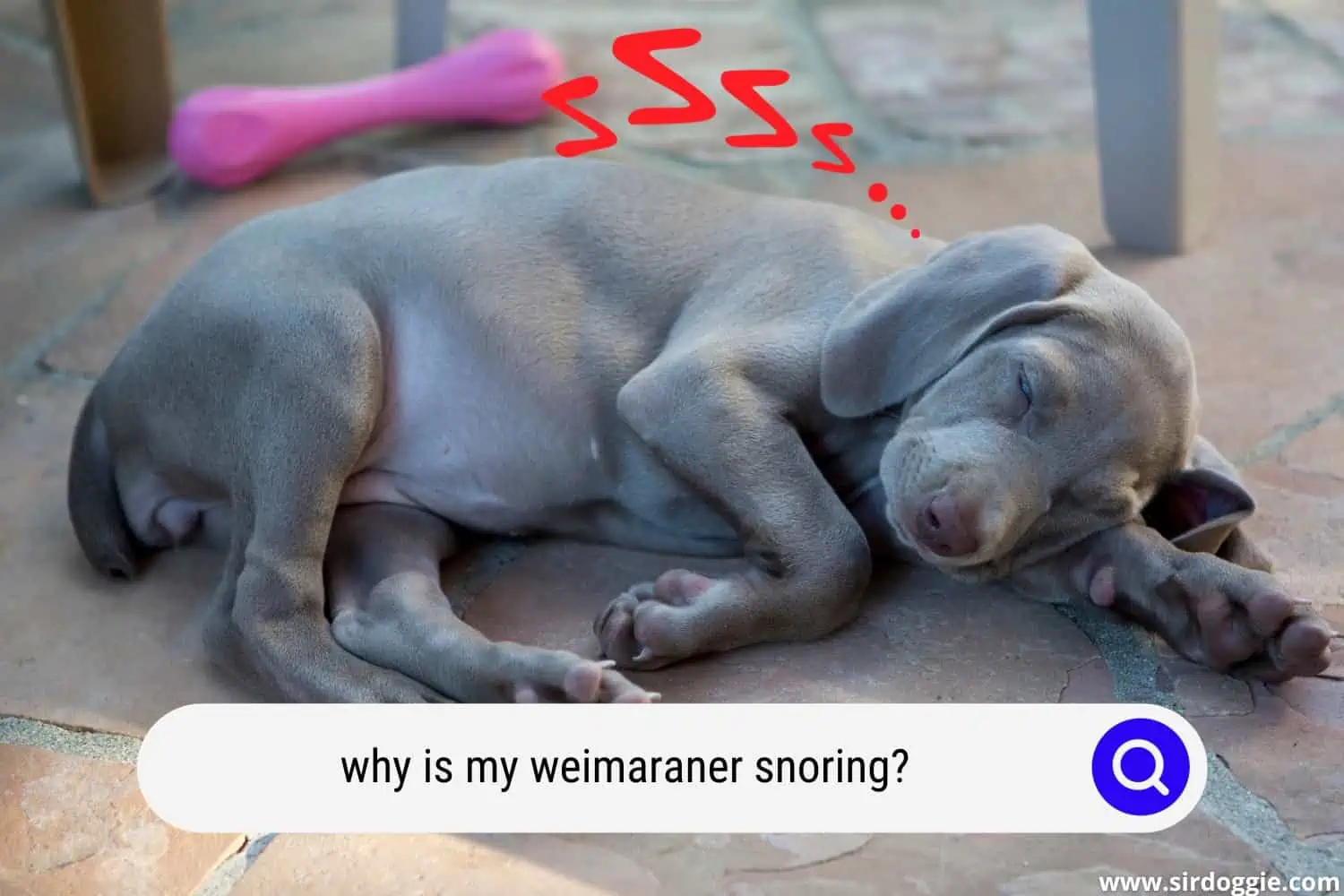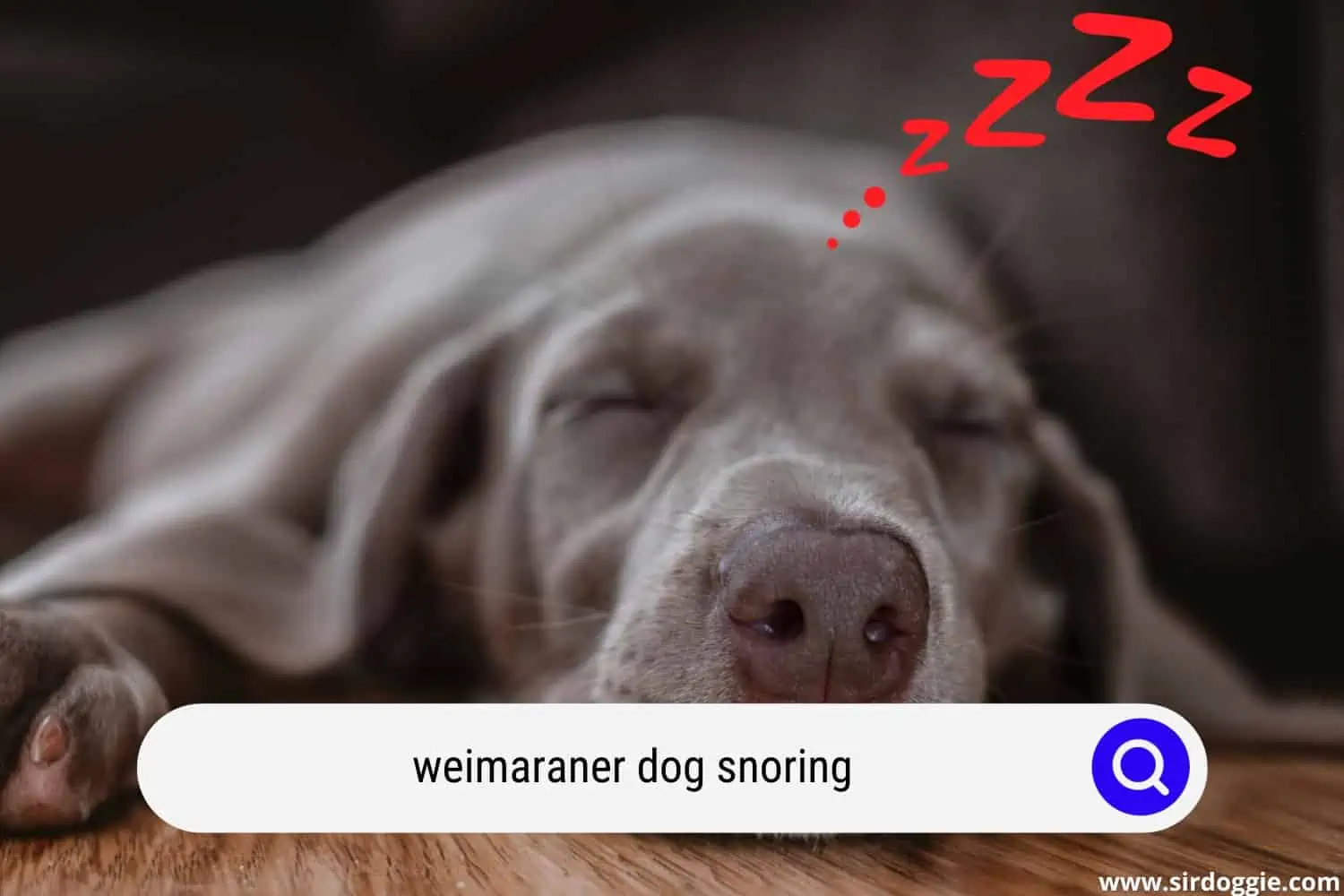Why Is My Weimaraner Snoring?
Pet snoring can be cute at first but not so cute if it starts to keep you awake while you try to rest. Weimaraner dogs are prone to snore a lot, especially at night when they go to sleep.

What Happens When My Weimaraner Dog Snores?
Noise occurs when the dog inhales or draws air into its lungs. The crucial word here is “suck” because this suction effect causes the vibrations of the tissues that create the sound of snoring.
There are many people who question the fact that their dogs snore while others do not. That is due to the differences in each dog’s anatomy, whether it is a Weimaraner or a canine of another breed. One of the most classic cases is a dog with a long, soft palate, like that of a Bulldog.
Keep in mind that this is normal for a large number of dogs belonging to breeds such as Bulldogs, Pugs, Boxers, Beijing, Shi Tzu, and others more characterized by a particular morphology of the face or mouth.
If you are the owner of any of the breeds mentioned above, you should not be alarmed since if you know your canine’s anatomy and morphology, you have to know that it is totally normal.
If your Weimaraner dog begins to snore as it usually does, it is because it has accumulated a few extra kilos. It is even the same phenomenon that occurs in humans when they are overweight. Snoring won’t be a problem for your canine, but overweight will.
We recommend establishing a diet of meals for your Weimaraner since if it continues to increase its body weight, it will be a future problem.
As they age, some Weimaraner canines may also begin to snore more frequently. Therefore, aging can be a normal cause, but it must be verified that it is not abnormal snoring.
Is It Normal for My Weimaraner Dog to Snore Excessively?
Yes, it is normal for your Weimaraner to snore when taking its naps, but there are times when snoring can be out of place.
You cannot stop your pet’s snoring, as it is impossible to prevent your Weimaraner from making those sounds. However, there is a possibility that you can reduce or limit this phenomenon in your dog.
The morphology of a Weimaraner is tall, slender, and refined. However, this animal has, like the Vizsla canine, a deep chest that strengthens your pet’s snoring much more strongly.
What Should I Do if My Weimaraner Snores Normally?
The first thing you have to do is improve your pet’s sleeping conditions. Therefore, you have to do the following:
- Make sure your Weimaraner’s bed is hygienic (it is important that it is always clean and free of lint or dirt).
- If the room where your dog usually sleeps is too dry, install a humidifier, which will allow your pet’s nights to be calm and comforting.
- Ventilate the room where your Weimaraner sleeps to limit dust and parasites.
- Change its sleeping basket if it is a bit narrow because snoring can decrease according to its posture. It is better if it sleeps in a large and comfortable place.
- Add a cushion under your dog’s head to sleep. That can help your Weimaraner breathe easier.
What Should I Do if My Weimaraner Snores Abnormally?
If your canine does not have the same breathing or snoring as usual or if you have noticed a drastic change in which your pet snores loudly and intensely, the causes could be serious:
- Allergies to smoke, dust, and certain chemical particles in household products.
- It may be suffering from an infection or inflammation of the nose and pharynx.
- Problems with the respiratory system (lungs, bronchi, etc.).
- Presence of parasites on the snout, in the nostrils, or the throat.
- Heart disease, tumors, and polyps.
- Appearances of foreign bodies in a nostril or trachea.
Do Weimaraners Really Snore a Lot?
Yes and no. There are many people who claim to have a Weimaraner dog that does not snore at all. On the other hand, many individuals consider these animals to be one of the breeds most prone to constant snoring, which can be reprehensible and not at all attractive.
A snoring dog should be checked to determine which treatment is the best. Some canines are especially prone to an allergic reaction that causes a narrowing of the airway, causing the animal to snore.
There may also be excess tissue in the area that is preventing the dog from breathing properly. It is best to have your vet verify the different factors by carefully evaluating your Weimaraner’s anatomy and the general physical symptoms it may be exhibiting.

What are the Main Causes of My Weimaraner Dog Snoring?
Weimaraner Medication
There are certain medications that can cause temporary snoring that will disappear as soon as you stop taking the medicines.
These medicines are mainly:
- Antihistamines.
- Muscle relaxants.
- Analgesics.
- Sedatives.
Weimaraner Overweight
The overweight of a dog causes an appearance of tissue around the throat that can cause a partial obstruction in the airways and lead to snoring. The snoring will disappear when the weight of the animal is corrected.
Weimaraner Allergic Reaction
Sometimes snoring is caused by an allergic reaction that causes a narrowing of the airways. Allergies prevent the proper circulation of oxygen and can also cause sneezing and runny nose, a sign that they directly affect the respiratory tract.
If your Weimaraner is prone to allergies, exposure to dust, pollen, or smoke will increase snoring.
Weimaraner Nasal Passage Obstruction
External agents can obstruct the nasal passage (especially if it likes to make holes or roll in the grass, or even when eating and drinking, debris can get into the nasal passages), a tumor or cyst (in which case there is no choice but surgery) or because it has a cold and a stuffy nose. In these cases, snoring is temporary and is reduced by cleaning the nose of your Weimaraner dog.

Family Dog Expert Author
Hi there! I’m Stuart, a devoted dog lover and family dog expert with over a decade of experience working with our furry companions. My passion for dogs drives me to share my knowledge and expertise, helping families build strong, loving bonds with their four-legged friends. When I’m not writing for SirDoggie, you’ll find me hiking, playing with my beautiful dog, or studying music.